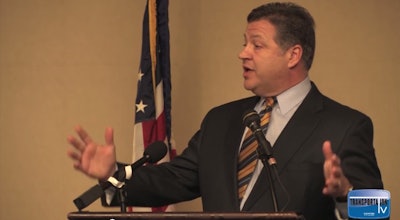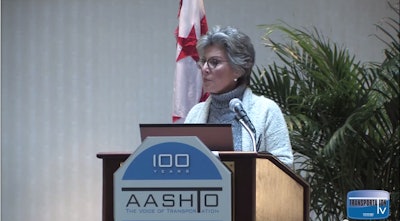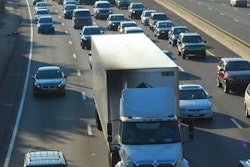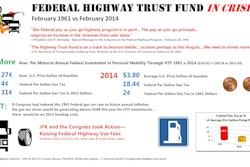Prospective jobs and current jobs hang in the balance of Congress’ ability to pass a highway funding bill on time, say two of the leading Congressional members responsible for creating and pushing the next surface transportation reauthorization bill through Congress.
 Rep. Bill Shuster speaking at the AASHTO Washington Briefing Thursday.
Rep. Bill Shuster speaking at the AASHTO Washington Briefing Thursday.Rep. Bill Shuster (R-Pa.) and Sen Barbara Boxer (D-Calif.) both chair their respective chamber’s transportation committee, and both told a large audience of attendees at the 2014 American Association of State Highway and Transportation Officials Washington Briefing that transportation and infrastructure funding bills are paramount to creating new jobs and keeping current jobs in place.
“Any time I look at a transportation-infrastructure bill, it’s a jobs bill to me,” Shuster said Thursday, saying a good bill will create more than just jobs building new roads. “I’m talking about…the jobs that keep our manufacturers competitive in a world economy. Making sure products getting to our stores that American citizens are buying are getting there as efficiently as possible so they don’t spend more money on them — they can put that money in their pocket and invest it in other things.”
The current funding law, MAP-21, said Boxer, saved about 3 million jobs in the U.S., and if Congress can’t find a way to shore up the Highway Trust Fund before its expected bankruptcy date sometime in the late summer, about 1.8 million jobs could be lost, she said.
“What else do we do that creates so many jobs in our states?” Boxer asked. “Very little, frankly. [Highway funding is] about way of life. It’s about our good jobs. It’s about our healthy businesses, and it’s about moving us forward,” she said at the conference.
The U.S.’ place in the world as a premiere economy and its footing as arguably the strongest global competitor both being at stake was a common thread at the AASHTO conference, as Secretary of Transportation Anthony Foxx made similar points in his address to the attendees Thursday.
 Sen. Barbara Boxer said there will be “serious consequences if we don’t act” to shore up the Highway Trust Fund.
Sen. Barbara Boxer said there will be “serious consequences if we don’t act” to shore up the Highway Trust Fund.Shuster said that while U.S. politicians stand back and argue about making the investments or not, the country is losing ground while other growing powers like Brazil and China are moving forward by investing in their country’s infrastructure.
Shuster told the AASHTO attendees to make two lists to send to their members of Congress: One of projects that won’t get done if Congress fails to act on a new highway bill and one of projects that will get done if Congress does pass a bill.
Boxer, too, urged the attendees to get face time with their senators and representatives. She also said she’s started working on the next bill, and “it’s going well.” She’s shooting to have the Senate version of the bill begin mark up in April.
Shuster, likewise, said he wants to begin mark up on the House version in the spring.
The two major proposals presented this week — one by President Barack Obama and the other by House Ways and Means Committee Chairman Rep. Dave Camp (R-Mich.) — “are encouraging,” Shuster said. “The American people need to hear these things to know we have to figure out how to do this, to make these investments to keep our country competitive.”
Boxer said the Highway Trust Fund shortfall isn’t a temporary problem and is something Congress must find a long-term solution for. The gas and diesel tax may no longer be the right solution, she said, and there may not be support for raising it.
The president’s plan for corporate tax reform to fund highway spending is viable, Boxer said, though she noted there may not be support for that plan, either. She also said a vehicle miles traveled tax could be a solution, though Congress would need to find a way to levy it without using a black box to track cars and trucks.
However, Boxer said she feels confident the bill will be a five- to six-year bill — as opposed to MAP-21’s two years. “I’m a pragmatist,” she said. “I just want to get this done for us. We have to work with realities: We’re not going to cut education. We’re not going to repeal the Affordable Care Act. So let’s be pragmatic. Let’s not engage in ideological squabbles about how to pay for it: Let’s just find a way.”











